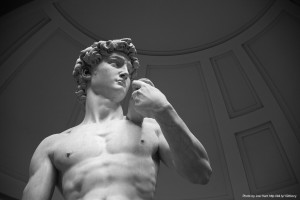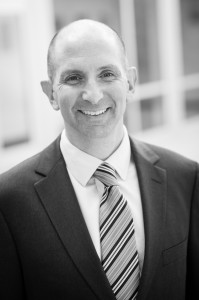 While studying in England when I was much younger, I had a conversation with an elderly nun who dedicated her life to serving the vulnerable on the streets of London. While we were talking, she shared a story about the origins of Michelangelo’s statue of David.
While studying in England when I was much younger, I had a conversation with an elderly nun who dedicated her life to serving the vulnerable on the streets of London. While we were talking, she shared a story about the origins of Michelangelo’s statue of David.
“One of the most beautiful sculptures ever created,” she explained, “Started out as a piece of misshapen marble that had been discarded and left to deteriorate in the elements. Looking at that eroded piece of oversized stone, Michelangelo declared, ‘I see the boy David trapped in there.’” And so the master artist set to work releasing the boy David, the future King David, from the weatherworn marble.
According to legend Michelangelo never felt he was creating anything. He believed he was merely releasing the sculpture held captive by the confines of the rough stone. Its true beauty was always there but locked away like so much hidden human potential.
We at JFS – our staff, volunteers, Board and donors – strive to help people release themselves from those restricting places: be they a woman trapped in the confinement of an abusive relationship, or a refugee struggling in a strange new land.
We do not create success; rather, we help people do the work to tap into their hidden potential – to find their success and their freedom. At JFS we see these monumental efforts every day. And it drives us and inspires us to work harder on behalf of those we serve.
Like the Congolese woman we resettled who is the embodiment of grit. When her village was attacked, she was beaten, raped and left for dead. The attackers dragged her young children and husband into the forest. Their father was killed and her children were left to die alone. Miraculously the children were saved and after several months, the remnants of her family were reunited in a Kenyan refugee camp.
Today, this single mother leaves her apartment in south Seattle and those children before six every morning and returns after nine every night. She has to take multiple busses and walk distances to work her long shift as a housekeeper. This woman continually makes whatever sacrifices she needs to ensure her children have a better future than their past. Many of our ancestors have lived a version of this story.

At JFS we believe nobody – nobody – in our community should feel trapped and without hope. The captives, be they flesh and blood or marble, need the sculptor with his chisel. We are committed to helping those who turn to JFS shape their potential into reality – potential that is too often confined behind the walls of terrible circumstances.
According to the legend, Michelangelo transformed the perceived deficits of that rejected piece of marble into the elements of David’s elegance. A scar in the side of the marble became a rib. Its odd dimensions became his stance, portraying the moment just before he steps forward to face his much greater adversary. Michelangelo saw potential and beauty entombed in the stone. He saw what could become, not what was.
All of us at some point in our lives have felt trapped, confined and burdened by the feeling that the life we are leading is not at all the life we were hoping for. The tradition says, “The captive cannot free himself from captivity.” In the lives of the people we serve, the causes of their captivity are as diverse as the people in this room.
I was talking with a client recently who shared how quickly and unexpectedly it all happened. First his sister was diagnosed with cancer, and he became the primary caregiver. Not long after, his mother slid into dementia. The pressures mounted with the responsibility. He said, “We become either the caregiver or the one cared for in the blink of an eye.” The person hoping to be released or the person with the chisel. And most of us are not prepared.
We may become the aging parent who takes a fall, or we may be the son or daughter taking care of that parent. We may be the one whose addiction, or depression, or mental illness takes hold; or, the one helping our child who is struggling in that battle. Nobody should struggle alone.
Our task in the world is to help the vulnerable in our community find their release and their radiance. To help them realize they have a value much greater than the sum of a series of terrible experiences. That their scars can be turned into strengths. Their rough places may one day shimmer with hope and possibility.
Our work is not easy and can’t be accomplished overnight with simple fixes. This past year our team of professional staff and dedicated Board Members have been focused on how to measure our progress. How do we help as many people make it as far as possible with limited resources? We are aligned toward this common goal.
Like every craftsman we are continually striving to refine our tools, hone our skills and evaluate our work. As individuals, none of us has the genius of Michelangelo, so we must work together. Some of us are the stone cutters, volunteering week after week in the food bank, teaching English or visiting an isolated senior. Others are the sculptors, helping us to define the strategies that most effectively serve the vulnerable in our community. Each of us has a role. The task and the need are great, but the reward is greater. And this is what we are called to do.
The statue of David depicts the young man of potential, the future king, turning with determination to fight a much greater adversary. The boy David is a symbol of the underdog prevailing over a seemingly insurmountable obstacle.
He is also a symbol of those we serve at JFS. The thousands of individuals, like that Congolese woman, who daily set out with extraordinary effort to achieve a better life – to face their challenges with dignity and with courage.
Together, we walk side by side with these ordinary people as they fight their Goliaths. Together we can help those, who society too often disregards, take their raw materials of hope, grit and determination and find their freedom. And in doing this, we create something that, like the boy David, will stand as a challenge to our community today and a testament to future generations.
 By Will Berkovitz
By Will Berkovitz
Will is CEO of JFS. He originally delivered these remarks at the 2015 Community of Caring Luncheon. He and his wife Dr. Lelach Rave, live with their three children in North Seattle. Will is a long-distance runner, avid hiker and backpacker. He particularly enjoys volunteering in the Polack Food Bank and helping with refugee resettlement.





